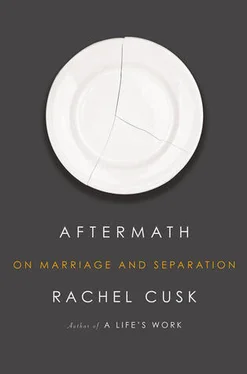X calls. Our conversation is like chewing on barbed wire, like eating ground glass. Our talk is a well that has been poisoned, but all the same I drink from it.
In Y’s room I sit in the armchair. It is a stiff old-womanish chair, though like everything else in Y’s room it feels solid and clean and as if it doesn’t quite belong to anybody. Y sits in a beige leather swivel chair with a sparkling steel skeleton and a deep padded seat. He is tall and what used to be called rangy. He has a beard, grey. I see him as an assemblage of joints and rods, like a large mathematical instrument; his big straight limbs pivot in their sockets with a mechanical ease and alignment in the clear morning light of his room. He is dressed in the manner of a Christian missionary or an aid worker, in clothes whose insignificance almost constitutes a significance of its own. Other than in this room his maleness has no context for me, and so like the chair he sits in he appears to be made of steel. I don’t mind it. I am broken, and steel might repair me.
I say, I don’t ever want you to tell me that I think too much. If you say that I’ll leave.
Y is silent for a long time. When he begins to speak, it is to outline for me the codes of conduct pertaining to his consulting room. He talks about timescales, the longer view, the inflexibility of the fifty minutes that is both its weakness and its strength. He goes on to discuss the general import of our relationship, the symbolism of its contractual essence, its politics of transference, seduction and blame. I begin to feel like a horse struggling while a harness is put over its head. He refers to himself in all this rather frequently, as though he were an established landmark in my life, and I feel a spasm of vulnerability on his behalf. He is like a priest who has forgotten to check that his congregation believes in God before he sermonises them. Y’s religion is psychoanalysis, and I have not come to worship: I need to be converted first.
I say, I’m not sure this will work. I’m not sure this will do any good.
I feel jealous of Y’s beliefs. They seem to take up all his attention. I want to attack them, to damage them. I want to humiliate them by not believing in them myself.
Y looks slightly startled, but only like an actor would. He cocks his head to one side. Then tell me why you’re here, he says.
It is strange to discuss my marriage in this room; its neutrality is almost chastising, makes the story both more lurid and more sombre, like the orderly courtrooms in which suited committees analyse war crimes, carefully dissect individual acts of thoughtless brutality and havoc over matching coffee cups. It is aftermath, the thing that happens once reality has occurred. Will I ever find reality again, bloodied and pulsing, find my way out of this room and back down the road along which I came? Y listens, stroking his large knuckles. I talk and talk, as though I am on the stand. I talk in expectation of a judgement, for or against me I do not know. Finally he opens his mouth to speak.
We have to stop now, he says.
Z comes to see me. We take a walk in the countryside. I expected him to bring something — I don’t really know what — but he comes empty-handed. He is quiet, nervous, taller than I remembered. He seems different every time I look at him. His face and form change by the minute. I don’t know him. If he had brought something at least I’d know that. But he seems not to want to make himself manifest. He is mysterious.
As we walk we talk. In our conversation I keep missing my footing. It is as though I’m expecting there to be a step down and there isn’t one. I’m used to talking to someone else. Z walks quickly; I have to run to keep up. He says, narrative is the aftermath of violent events. It is a means of reconciling yourself with the past. He says, the violence in the Odyssey is a story told afterwards, in a cave.
I want to live, I say. I don’t want to tell my story. I want to live.
Z says, the old story has to end before a new one can begin.
We are in a downland valley, where warm tousling winds roll across meadows of long grass and wildflowers. A silver river runs through it in slow skating curves to the sea. It is quiet here, but there is a clamour in my head. I feel charged with tension, as the sky is charged with electricity before a storm; I feel the approach of some great disturbance. The mechanism of life is jammed, the way minutes and hours and days knit themselves, gather in the separate strands and knit them fast together into life, into being — it is jammed, blocked, broken. The clamour is like a maniacal orchestra, crashing and clanging its gongs and cymbals. I can’t process what I see or hear or feel: impressions, sensations pour in but they can’t get out again; they mount and mount in the silent valley until I feel that I will burst with them.
Z and I drive without speaking back to the city.
That night I call X. I don’t know why I call him. I just want to talk, like a climber trapped in a snowstorm on a mountaintop calling home. It is rescue she hopes for, but perhaps she is stranded too far and too high to be rescued. Perhaps she just wants to say goodbye. The roaming itch that drove her away from home, away from ordinary satisfactions, away from the life at sea level, remains mysterious even as it devours her in that cold and lonely place. She calls what she left, calls home.
X answers. Our conversation is like chewing on razor blades, like eating caustic soda. Our talk is a well that has been poisoned, but all the same I drink from it.
I say to Y, marriage is a mode of manifestation. It absorbs disorder and manifests it as order. It takes different things and turns them into one thing. It receives chaos, diversity, confusion, and it turns them into form.
Y strokes his knuckles.
I say, marriage is civilisation and now the barbarians are cavorting in the ruins.
Yet we find ruins exquisite, Y says.
He seems to be accusing me of sentimentalising. He seems to suspect me of nostalgia.
People overthrow their governments and then they want them back, I say. They evict their dictator and then they don’t know what to do with themselves. They complain that everything is chaos now, that there is no law and order any more.
Y raises his eyebrows at the word ‘dictator’.
I tell him about the walk with Z. If I was looking for a new dictator, Z didn’t get the job. I tell him of the way I showed him around my house, bought flowers, made him a beautiful lunch, like a small country advertising itself for invasion. I tell him of the valley I took him to, the loveliest place for miles around with its band of silver running through it, the way I showed it to him as proudly as if I’d made it myself.
Yet the mechanism had jammed, the very knit and weave of life knotted into madness.
Is it male attention I want, or male authority?
Is there a difference? Y says, rummaging pleasurably in his beard.
Z attended to my vision but he wouldn’t take possession of it. He backed away and was silent; it remained my house, my valley.
X talks. X is a talker. He is like a well signposted museum: it’s easy to find your way around, to see what he chooses to display. There are new things there now, new people, new opinions, new tastes in evidence; the old ones have been taken down to the archive, I suppose, shut away in darkness, left to the mercy of rot and floods.
But he doesn’t like me to visit, doesn’t want to talk to me any more. The museum guards follow me closely; perhaps they suspect I’m going to steal or deface something. I keep enquiring after what is no longer part of the collection. X furrows his brow, as though he has difficulty recollecting it, this past to which I insist on referring. As soon as he can, he shows me out. The big institutional door, so handsome and polished, so reassuringly heavy, closes in my face.
Читать дальше












